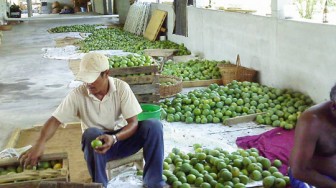Leslie Anthony exports mangoes and vegetables to Canada. He has an arrangement with Caribbean Airlines (CA), which can sometimes be hit or miss, since his cargo is dependent on the availability of space on the aircraft. As a result he has a high percentage of wastage particularly of mangoes and would like to explore valued-added products if the conditions are right.
When Stabroek Business went to Anthony’s home on Sunday to talk with him about his mango export business, his wife was apologetic about his failure to keep the appointment. He had received an unexpected call from CA earlier advising him to get to the Cheddi Jagan International Airport with such cargo as he had for shipment to Canada, since some space had become available on the aircraft. He had no choice but to make the impromptu journey from Adventure, Essequibo Coast.

Though CA is Anthony’s best bet, it is by no means the ideal carrier, he says. The availability of space on the flight to Canada is often only disclosed at the ninth hour – so to speak – and last Sunday was not the first occasion on which he had to make the unexpected journey. There are occasions too when Anthony’s cargo is delayed in Trinidad for several days. There is spoilage and loss of revenue. Under the arrangement with CA, the freight charges have to be paid anyway.
“Each time cargo leaves Guyana, I am shipping at my own risk,” Anthony says. In fact, Caribbean Airlines insists on securing a signature to a declaration that the cargo is being freighted at the owner’s risk, every time.
Anthony’s wife Basantie and his uncle Yusuf are his ‘right-hand men.’ They are familiar with the business. They talk, first, about the logistics of packing and exporting. The mangoes are transported to Supenaam in Leslie’s Canter truck. They are packed in cardboard boxes. At Supenaam he hires a boat to take him to Parika, after which he hires someone else’s Canter truck at Parika to take him to the airport.
There are several layers of security there. There is CANU, Customs and then there is airline security.
Even before the mangoes are taken to Timehri, Leslie must engage the Guyana Revenue Authority and the Ministry of Agriculture to secure their respective clearances. Residing as he does on the Essequibo Coast he cannot engage those agencies in person. He must hire a broker.
Anthony’s uncle Yusuf says the family has been in the business of selling mangoes for more than 40 years. For much of that time their primary market was in Georgetown. Canada is a step up for Anthony. He told this newspaper by phone that it is more lucrative than the local market. Canada is preferable to the United States which has a thicket of food safety and other regulations that make the transactions cumbersome.
In Toronto, Anthony has two customers; Tamisha Trading and, more recently, JB Tropical. There are always risks associated with dealing with customers thousands of miles away. Over time Anthony has had to bring arrangements with clients in the US, Canada and the Caribbean to a close because they did not pay for shipments. “It’s frustrating,” he says.
Each consignment comprises around 2,300 kilos of fruit. The airline charges US$1.26 per kilo and there are other charges that sometimes bring the total charge to up $10 per kilo.
Anthony was introduced to the overseas market by the New Guyana Marketing Corporation. Mangoes apart, he exports bora, saime, egg plant, squash, wiri-wiri pepper, thyme and sweet basil (married man pork). Unlike some merchants he has no farm of his own. He purchases mangoes on the Essequibo Coast and vegetables from Bourda Market. He had made an application to government for farm land. However, he says, the land allocated to him is not suitable for planting mangoes. The method of acquiring mangoes involves “renting” the trees, he says. The contracts are mostly oral and the haggling can sometimes be complicated.
Anthony’s operation requires the recruitment of three to five persons. He favours picking the mangoes himself. They should not be allowed to fall to the ground. Anthony complains that the owners of the trees do not clean them. Pests have been known to affect entire crops of fruit.
The mangoes are picked, cleaned, sorted and packed for freighting. Limited space on aircraft means that Anthony can only export about a third of the mangoes he harvests. The remainder is either sold in Georgetown or else, thrown away. Every week, Anthony has to dump about ten crates of mangoes. He says he would be prepared to set up a cannery if he is allowed a duty-free concession to import the equipment.








